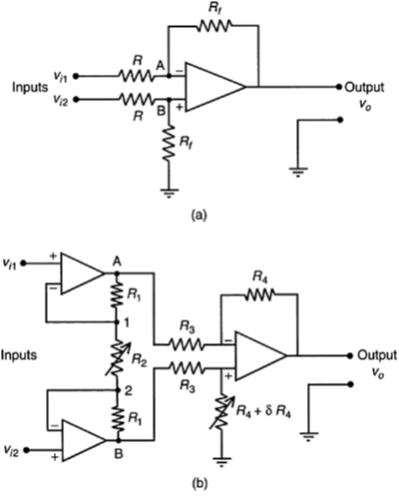Instrumentation Amplifiers
Instrumentation Amplifiers
An instrumentation amplifier is typically a special-purpose voltage amplifier dedicated to instrumentation applications. Examples include amplifiers used for producing the output from a bridge circuit (bridge amplifier) and amplifiers used with various sensors and transducers.
An important characteristic of an instrumentation amplifier is the adjustable gain capability.
The gain value can be adjusted manually in most instrumentation amplifiers.
In more sophisticated instrumentation amplifiers the gain is programmable and can be set by means of digital logic. Instrumentation amplifiers are normally used with low voltage signals.
Differential Amplifier
Usually, an instrumentation amplifier is also a differential amplifier (sometimes termed difference amplifier).
Note that in a differential amplifier both input leads are used for signal input, whereas in a single-ended amplifier one of the leads is grounded and only one lead is used for signal input.
Ground-loop noise can be a serious problem in single-ended amplifiers. Ground-loop noise can be effectively eliminated using a differential amplifier because noise loops are formed with both inputs of the amplifier and, hence, these noise signals are subtracted at the amplifier output.
Since the noise level is almost the same for both inputs, it is canceled out.
Any other noise (e.g., 60 Hz line noise) that might enter both inputs with the same intensity will also be canceled out at the output of a differential amplifier.
A basic differential amplifier that uses a single op-amp is shown in Figure (a). The input-output equation for this amplifier can be obtained in the usual manner.
For instance, since current through an op-amp is negligible, the current balance at point B gives



(a) A basic differential amplifier, (b) A basic instrumentation amplifier.